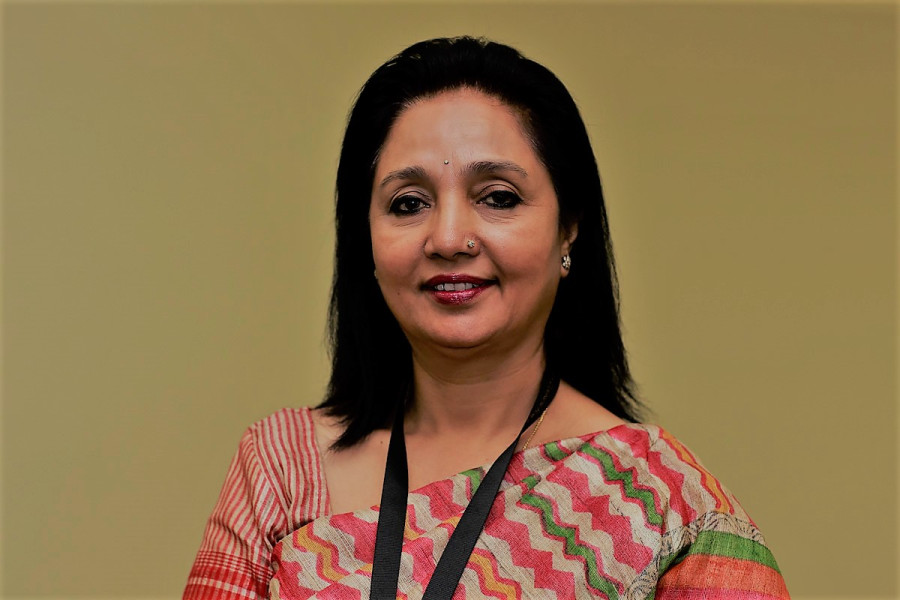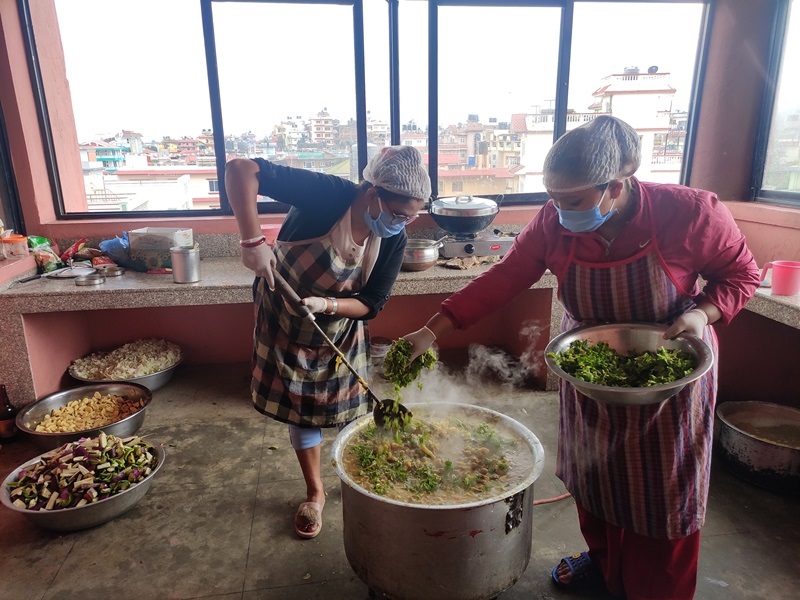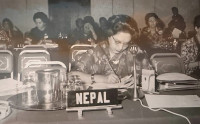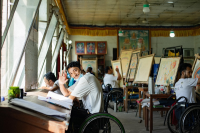Culture & Lifestyle
‘Women are the most vulnerable right now’
As the nation-wide lockdown extends, Lily Thapa talks about how mass starvation could become as big a crisis as Covid-19 in Nepal and how her nonprofit has provided more than 10,000 meals to low-income families.
Srizu Bajracharya
It’s day 45 of the country-wide lockdown to curb the spread of Covid-19. And despite the strict lockdown, the number of cases in the country is rising. Also rising is the number of people who are finding it extremely challenging to feed themselves as restricted movement has halted work for thousands of daily wage workers.
“Many people are realising that the immediate danger they face is starvation and not Covid-19,” says Lily Thapa, the founding chairperson of Women for Human Rights, a nonprofit that fights for the rights for single women across Nepal. To help those who can't put together two meals a day, Thapa has been organising a fundraiser with her organisation through GoFundme to feed more than thousands of daily wage workers and low-income families. The initiation has now served more than 10,000 meals.
In this interview with the Post’s Srizu Bajracharya, Thapa talks about the need for philanthropy and why, even during this pandemic, people still need to talk about women empowerment and discuss women issues. Excerpts:
How did this idea about the food bank come about? Was it challenging to put together a staff to make food for hundreds during the lockdown?
When the lockdown began, we had started by distributing relief packages that included raw food materials. But we soon realised that many families didn’t even have utensils to cook. Then, we were confused as to whether we were reaching the right people or not; I mean, anyone could come and get rice packages, even those who didn’t need help, leaving those who needed it hungry. That was why we thought we should cook for people.
But initially, we were also worried if people would be ready to eat the food we prepare because hygiene was a big factor and people are usually sceptical about donated cooked meals. We started by making food for 50 people. This was after the first extension of the lockdown. But by the third day, we were making food for 300 people, and now we prepare food for as many as 1,500 people daily around Budhanilkantha.
We are working with our staff, but this whole experience has been heartwarming as everyone has been supportive. We have volunteers coming from everywhere, neighbours coming to cut vegetables and to pack the food and others to make deliveries in vans and bikes to people who cannot come to get food here.
The local government too has been helping us identify people who need our food aid. We have also received a lot of help from other people, besides financial donations, people have also been donating rice and vegetables.
How do you think the lockdown has brought to the fore the socio-economic disparity?
For many of the families that we are trying to help, more than the virus, their current situation is scarier. For many daily wage workers, the lockdown has stripped any opportunities for work. Women who work mainly in the informal sector as domestic help have been forced to stay home. There’s no doubt that our current situation has hit the people from the lower economic strata harder than the others. They have been urging us to provide two meals per day because they really rely on this support.
There are students living on their own, far from their hometowns and families, and for them, this has been a difficult time. There was one student who came to thank us because she could finally tell her mother that she was having rice every day. Such are the times we are living in. Socio-economic disparity has always been there, but the virus has deepened that inequality even more.
What do you think about the impact the lockdown has on women? Do you think talking about women empowerment at a time like this is insensitive, as everyone is going through something?
Women are the most vulnerable right now as the stress and anger our current situation is suffusing are bound to impact women particularly in one way or the other. In many cases, it may result in domestic violence on women or rise in mental stress. Our organisation has been receiving a lot of reports on women violence already. Just today, we heard more than five cases of domestic violence.
You also have to understand that with the lockdown, many women are now housebound. And for many of them, that means enduring the pressure of patriarchy. Not just that, single women families may be suffering to make ends meet, even pay rent all the while facing problems because they are women. The informal sector and micro enterprises that primarily employ women have all been affected because of the lockdown.
And so, we have to talk about women empowerment even all through this because we need policies and projects that empower and encourage women in these sectors. We have to make sure that there are enough gender-responsive projects to protect and enable women, as our current problem may push issues of women to the wayside and we must see that there are programs that address them.

How lasting of an impact do you think Covid-19 will have on development organisations??
When the lockdown is over, for many organisations, especially NGOs, it’s going to be quite challenging, as a lot of them depend on foreign aid. And, understandably, much of the international help that will be coming in will be diverted to tackle the virus.And so, these institutions and organisations must seek ways to be sustainable and independent. They will need to be able to generate income for themselves to continue their work. And that is why I think the broader focus will and should be on sustainability.
This pandemic has been a great teacher in telling us why we need to be prepared and why we need more institutions that promote philanthropy. Lately, we have become more accustomed to the culture of consumerism, but I think here we have to focus on preservation, investment and food security.
What has been the motivation to keep going with this movement? How do you see philanthropy at this hour of crisis?
We have been able to help more than thousands, not because of us but because of people who want to help each other in these trying times. This foodbank wouldn't have been efficient without the help of the community. And it’s been overwhelming to see how people have come together to help each other. But understanding and getting to see how our work has helped the people in need has been our greatest motivation to keep continuing with this programme.
In times of crisis, the people in the community are as accountable as the government for a solution; we just need good leadership and coordination. This is a time for us to show solidarity and support each other. Right now, we need more philanthropy than ever as this is the only way we can reach to everyone who requires assistance.




 8.22°C Kathmandu
8.22°C Kathmandu















